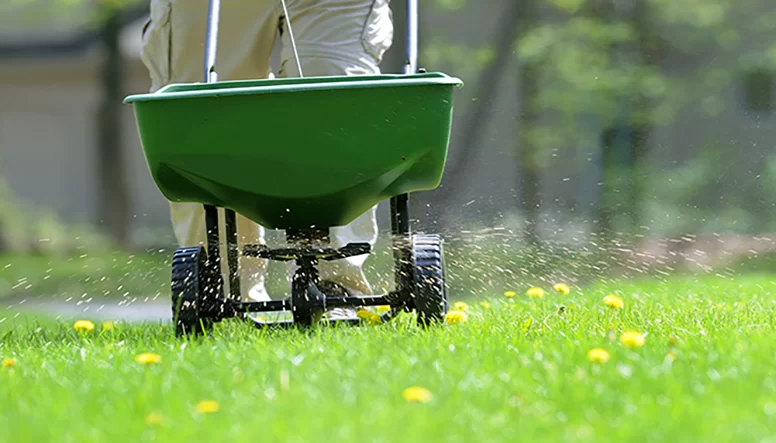
The Importance of Regular Lawn Fertilization for a Thriving Lawn
As someone who has spent years caring for lawns, I can tell you one thing: a healthy lawn doesn’t just happen overnight. It requires consistent care, attention, and most importantly, regular fertilization. You might have noticed that after a season of neglect, your lawn may not look as vibrant or lush as it once did. Well, regular lawn fertilization is the secret ingredient to transforming a lackluster yard into a thriving green paradise.
Why Regular Lawn Fertilization is Crucial
Many homeowners believe that watering their grass and mowing it regularly is enough. However, these tasks alone can't provide the nutrients your lawn needs to thrive. Lawns, just like any other plants, require a balanced supply of nutrients to grow strong and healthy. Regular fertilization ensures your grass has the essential nutrients it needs for strong root development, improved drought resistance, and better overall growth. Without it, your lawn may struggle to fight off weeds, pests, and disease.
Think of fertilization as feeding your lawn. The soil in your yard can only hold a certain amount of nutrients, and over time, those nutrients get depleted. Fertilizers replenish those nutrients, allowing your grass to stay lush and strong. Just like a person needs regular meals for energy, your lawn needs fertilization to stay vibrant and resilient.
The Benefits of Regular Fertilization
There are several benefits to regular lawn fertilization. The most obvious is the improved appearance of your lawn. A well-fed lawn will look lush, vibrant, and green throughout the seasons. But the benefits don’t stop there.
1. Improved Root Health
Fertilizers help strengthen the root system of your grass, which is essential for long-term growth. Stronger roots mean better drought resistance and a lawn that can bounce back more easily from the stress of heavy foot traffic, extreme temperatures, or pests.
2. Enhanced Pest Resistance
A healthy, well-nourished lawn is more likely to fend off pests and diseases. By fertilizing regularly, you ensure that your grass has the energy to naturally fight off invaders, preventing the need for harmful pesticides that could damage your lawn in the long run.
3. Greener, Denser Grass
Fertilizing your lawn encourages thick, dense grass growth. Dense grass is a natural barrier to weeds, making it harder for unwanted plants to take root. It also gives your lawn a more aesthetically pleasing appearance with fuller coverage, which improves the curb appeal of your home.
When and How to Fertilize Your Lawn
Understanding the right time and method for fertilizing your lawn is essential to getting the best results. You don’t want to overdo it or apply the wrong type of fertilizer, as this can harm your grass. Here’s a guide to help you get it right:
1. Timing Matters
The best times to fertilize your lawn are typically in the spring and fall, when grass is actively growing. Spring fertilization helps give your lawn a strong start after the winter months, while fall fertilization strengthens your lawn for the winter and prepares it for the following spring. In some areas, a light application in the summer can also be beneficial, but be careful not to over-fertilize during the hot months as it could burn the grass.
2. Choosing the Right Fertilizer
Not all fertilizers are created equal. The type of fertilizer you need depends on your grass type, soil condition, and local climate. A good rule of thumb is to use a balanced fertilizer with equal parts nitrogen, phosphorus, and potassium (often labeled as N-P-K). Nitrogen promotes leaf growth, phosphorus supports root development, and potassium helps with overall health and disease resistance. Organic fertilizers can also be a great option, as they improve soil health over time.
3. Application Methods
Fertilizers can be applied using a broadcast spreader, which helps distribute the granules evenly across your lawn. For liquid fertilizers, you can use a sprayer for precise coverage. Be sure to follow the instructions on the fertilizer bag or bottle to avoid over-fertilizing, which can lead to nutrient runoff and damage to your lawn. It’s also important to water your lawn after fertilizing to help the nutrients penetrate the soil.
Real-Life Story: How Fertilizing Transformed My Lawn
Let me share a quick story with you. A few years ago, I had a lawn that looked pretty sad. It was patchy, yellowed, and full of weeds. I tried everything—watering, mowing, even pulling weeds by hand—but nothing seemed to help. It wasn’t until a neighbor suggested that I try regular fertilization that things started to change. I applied a balanced fertilizer in the spring, followed by another round in the fall, and within just a few months, my lawn started to look better than it ever had. The grass was fuller, greener, and much healthier. The transformation was nothing short of amazing!
This experience taught me that regular lawn fertilization is not a one-time fix, but an ongoing process that requires care and attention. Just like any other living thing, your lawn needs constant nourishment to stay strong and healthy.
Choosing Professional Lawn Care Services
If you’re feeling overwhelmed or just don’t have the time to fertilize your lawn yourself, there’s no shame in hiring professionals to do the job. Many lawn care services in the United States offer fertilization programs that are tailored to the specific needs of your grass type and local climate. Professional services will ensure your lawn gets the proper nutrients at the right time, taking the guesswork out of lawn care.
In conclusion, regular lawn fertilization is essential for maintaining a healthy, thriving lawn. It promotes strong root growth, enhances pest resistance, and ensures your lawn stays green and vibrant all year round. Whether you choose to fertilize yourself or hire a professional, making lawn fertilization a regular part of your lawn care routine is one of the best decisions you can make for your yard.








